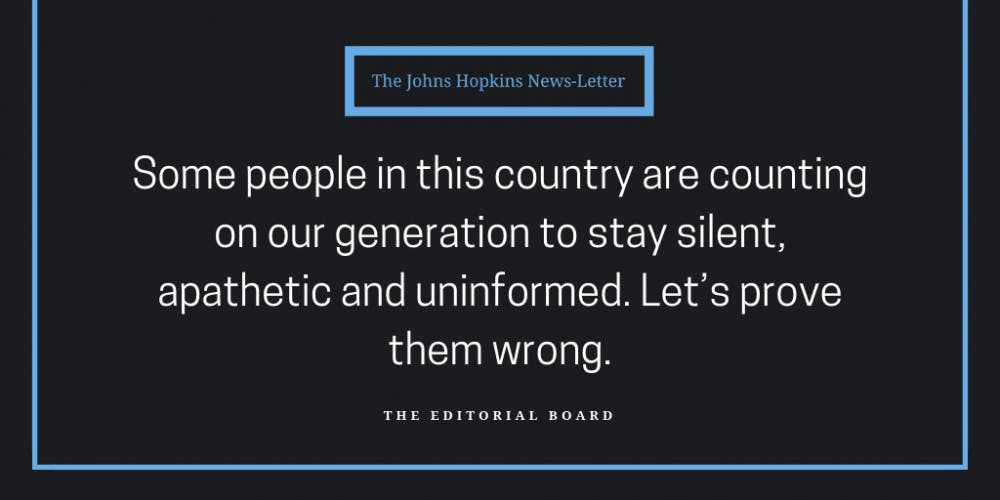Like we did two years ago for the presidential election, many of us headed to the polls, mailed in absentee ballots and attended watch parties for the 2018 midterm elections on Tuesday. Exercising our right to vote and participating in our country’s politics is one of our most valued responsibilities. Yet, midterm elections rarely draw the number of voters that presidential elections do. In 2014, voter turnout hit a historic low at 36.4 percent in comparison to 53.7 percent in 2012 and 58 percent in 2016.
2018 was different though. An estimated 113 million people voted in Tuesday’s 2018 midterm elections, making this the first midterm ever with over 100 million votes counted. In 2014, turnout was 83 million.
In the midst of these record numbers, how did the youth – our own age group – do in turning out the vote? We’ve seen in previous years that young adults aged 18-30 have the lowest voter turnout of any age group. In 2018, according to The Center for Information & Research on Civic Learning and Engagement, roughly 31 percent of youth ages 18-29 voted, a huge increase from an estimated 21 percent in 2014.
We are optimistic that this increase in youth voter turnout signals a greater investment in American politics. But our civic engagement cannot begin and end with voting in elections. We must do our part to be consistently and regularly informed, not just when when we check off boxes on ballots every two years.
Why? Because politics affect our lives whether we like it or not. Some of us may have the privilege of not having to think about it, but for others, policy decisions will either safeguard or threaten our most basic rights. Since the 2016 presidential election, many of us have come to realize the importance of politics. But the reality is that we still struggle to understand how the U.S. government works or how to stay well-informed on political issues. For example, a University of Pennsylvania survey in 2016 shows that only 26 percent of respondents could identify the three branches of federal government.
Granted, it can be difficult to remain interested in issues that seem unrelated to us. Many of us are from out-of-state and have become disconnected from the communities in which we grew up, even if we continue to vote there. We also become busy in our lives as college students, and it may seem like we don’t have time to be as involved in politics or campaigning as we would like. It takes time and commitment to be an informed voter and to stay up to date on issues both in our hometown and the city where we go to school. Furthermore, voting processes – with differing deadlines, rules and ballot formats – can seem unnecessarily complex, especially for first-time voters and first-generation Americans.
Despite these difficulties, we cannot be lazy or complacent. Real systemic obstacles, like voter suppression, disenfranchise millions of eligible voters during every election. Georgia’s Secretary of State Brian Kemp allegedly stalled 53,000 voter registration applications in his race for governor against female African American candidate Stacey Abrams. Seventy percent of those stalled applications were submitted by African-Americans. On Tuesday, voters reinstated voting rights for over 1 million ex-felons in Florida who had lost those rights upon being convicted. Our federal and state governments must remove structural barriers to voting. But in the meantime, we believe that Hopkins and other universities can seek ways to better foster political engagement in students. Why shouldn’t we make civic engagement easy and accessible for as many people as possible?
To their credit, University administrators have stepped up efforts to foster non-partisan political participation. Over the past year, with the help of the Student Government Association and the Center for Social Concern (CSC), Hopkins became one of over 300 universities to partner with TurboVote, an online voter registration service. The CSC tabled with voter registration information and hosted an absentee ballot party to encourage students to cast their ballots; it also provided stamps and envelopes for us to easily send our ballots in. On Election Day in 2016 and 2018, Hopkins provided us with free transportation to polling places, saving us time and money. Nonpartisan student groups like IDEAL have created spaces for us to develop our opinions and orient ourselves with different perspectives. This semester, the Aronson Center on International Studies hosted a speaker series focusing on the 2018 midterm elections and their foreign policy implications.
In addition to these measures, we believe that the University can further educate students by introducing a mandatory U.S. politics course during orientation. During O-Week, first-year students attend training on topics like consent and cultural sensitivity. Political literacy is critical for American and international students alike. International students are just as affected by policies as U.S. citizens and can engage politically whether by volunteering on a campaign, encouraging their peers to vote or even just having conversations about political issues.
We must all do our part to make our voices heard. Do everything you can to make sure you and others can vote, but don’t stop there. Read the news. Volunteer on campaigns. Go canvassing. Join marches. Call your representatives. Some people in this country are counting on our generation to stay silent, apathetic and uninformed. Let’s prove them wrong.





